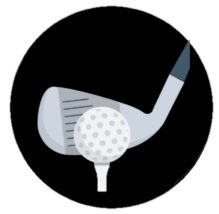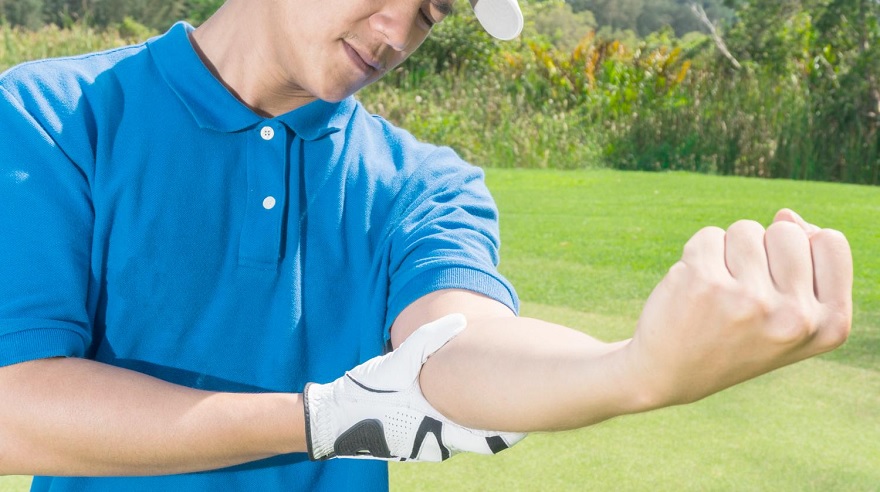What is the golfer’s elbow symptoms, treatment or brace? Golfer’s elbow isn’t as well-known as tennis elbow. While both are forms of elbow tendinitis, tennis elbow stems from damage to tendons on the outside of the elbow, while golfer’s elbow is caused by tendons on the inside. Golfer’s elbow is less common.
Golfer’s elbow is a form of tendonitis that causes pain and inflammation in the tendons that connect the forearm to the elbow. The pain centers on the bony bump on the inside of your elbow and may radiate into the forearm. It usually gets better with rest. The medical term is medial epicondylitis. Activities that require repetitive gripping motions, such as throwing, rock climbing, racket sports, or weight training, can often lead to golfer’s elbow. What is the golfer’s elbow symptoms, treatment or brace?
What is the golfer’s elbow symptoms?
With golfer’s elbow, the pain you have can happen suddenly or with time. If you have golfer’s elbow, you might have:
- Stiffness in your elbow
- Weakness in your hands and wrists
- Tenderness and pain, usually on the inner side of your elbow or the inner side of your forearm, but you could have pain with certain movements, like making a fist or swinging a golf club
- Tingling or numbness in your fingers (usually the ring and little fingers)
What causes Golfer’s Elbow?
Despite the name, this condition doesn’t just affect golfers. Any hand, wrist, or forearm motions that you do often can lead to golfer’s elbow.
Golfer’s elbow is usually caused by overusing the muscles in your forearm, which lets you grip, rotate your arm, and flex your wrist. Repetitive flexing, gripping, or swinging can cause pulls or tiny tears in the tendons. Things that can lead to golfer’s elbow besides golfing include:
- Sports that rely on lots of throwing movements, like archery, baseball, football, javelin throwing, and softball. Pitching a ball incorrectly for example, can lead to golfer’s elbow, too. In fact, it’s sometimes called pitcher’s elbow.
- Sports that use a racket, like tennis. Not using the right techniques when playing or using them incorrectly can hurt your tendon. If you’re using a racket that’s too light or too heavy, that can also cause golfer’s elbow.
- Weight training. If you don’t use the right technique for lifting weights, you can overwork your elbow’s tendons and muscles.
- Repetitive movements. If you’re a carpenter, painter, plumber, or you work in construction, you can get golfer’s elbow. Lots of forceful, repeating motions can cause it.
People may also get it from using tools like screwdrivers and hammers, raking, or painting.
Exercises to Prevent and Treat Golfer’s Elbow
Most of the time, golfer’s elbow will go away without any special treatment, but you can do stretching and strengthening exercises to help make it go away faster. They can also help you avoid golfer’s elbow.
- Eccentric exercises strengthen the muscle while it’s relaxed, not tight.
- Stretching helps with mobility.
Talk to your doctor or physical therapist to find out to come up with an exercise plan that’s right for you. Webmd has suggested below excises as remedy –
Golfer’s elbow stretch
You will feel this stretch in the underside of your forearm.
- Extend your affected arm in front of you with your fingers and palm facing up.
- Use your opposite hand to gently pull your fingers and wrist down toward your body.
- Hold this stretch for 30 seconds.
- Do 2–5 reps.
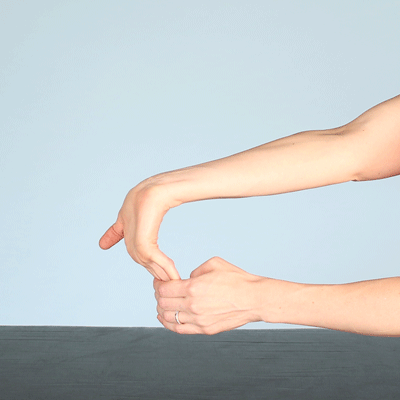
Isometric wrist strengthening (extension)
Keep your body still throughout this exercise.
- While seated, place your affected forearm on a table or the arm of a chair with your palm facing down.
- Place your opposite hand on the back of your affected hand.
- Press your affected hand up, using your opposite hand to create resistance by pressing down.
- Continue for 10 seconds, slowly increasing the resistance.
- Gently release. Do 15 reps.
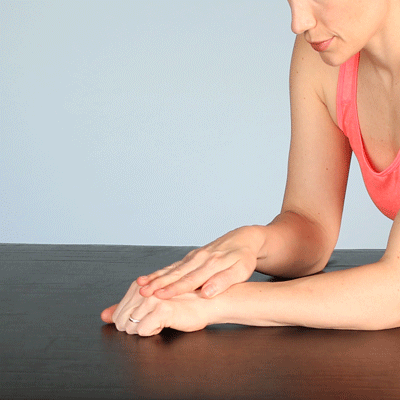
Resisted wrist extension
While seated, hold a weight with your affected arm.
- Place your forearm on a table or the arm of a chair with your hand hanging over the edge and your palm facing down.
- Slowly lower your hand down before raising it back to the original position.
- Do 1–3 sets of 15 reps.
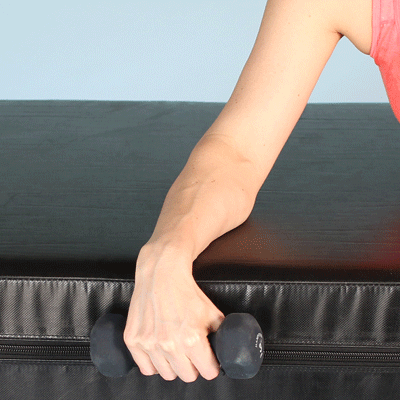
Isometric wrist strengthening (flexion)
Keep your body still while doing this exercise.
- While seated, rest your affected forearm on a table or the arm of a chair with your palm facing up.
- Press your opposite palm into your affected hand.
- Press your affected hand upwards as you use your opposite hand to create resistance by pressing down.
- Continue for 10 seconds, slowly increasing the resistance.
- Gently release. Do 15 reps.
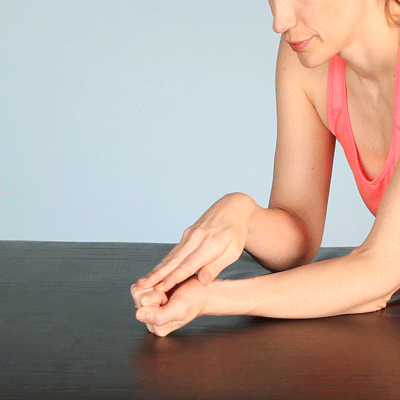
Resisted wrist flexion
While seated, hold a weight with your affected arm.
- Place your forearm on a table or the arm of a chair with your hand hanging over the edge and your palm facing up.
- Slowly lower your hand down before raising it back to the original position.
- Do 1–3 sets of 15 reps.
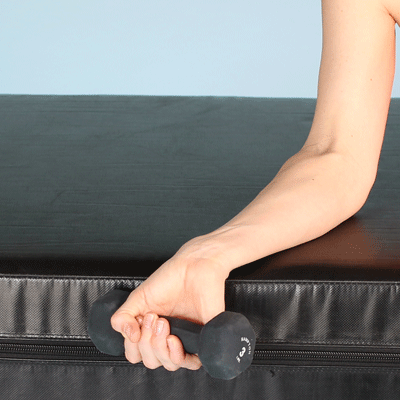
Diagnosis
Only a doctor can diagnose medial epicondylitis, and a physical examination is often all that is necessary.
The doctor will likely ask about daily activities at home and work. In some cases, the doctor will want to take an X-ray of the arm.
The physical exam will involve laying the forearm on a table with the palm up. The doctor will then apply pressure to the hand and ask the person to flex the hand towards the wrist.
Medial epicondylitis will be diagnosed if the person experiences pain on the inner side of the arm when flexing the wrist.
What is the golfer’s elbow treatment?

Initial treatment for medial epicondylitis can start before a person sees a doctor. Resting from the problematic activity may relieve the pain within a few days.
To aid recovery, a person may also:
- apply ice to the elbow and inner part of the forearm
- stretch the forearm
- use a brace for extra support
- return gradually to activity that involves the arm
- take over-the-counter pain and anti-inflammatory medications
- practice strengthening exercises
Elbow braces are available to purchase online.
In some cases, a doctor may also recommend:
- corticosteroid injections to reduce inflammation
- surgery
- plasma-rich protein injections
Surgery will be considered if other treatment options have not worked. The surgeon may remove damaged tissue. They may also remove buildups of scar tissue or extra bone, which could be putting pressure on the tendon.
Compare tennis elbow vs golfer’s elbow
The anatomical structures involved in tennis elbow and golfer’s elbow are very similar and the symptoms are also similar, but they appear on opposite sides of the elbow and arm.
Common symptoms of tennis elbow include:
- Pain that radiates from the outside of your elbow and down your forearm
- Tenderness on the outside of your elbow
- Weakness in your forearm or a weak grip
- Pain when you grip things, twist something or, if you play tennis, especially with backhand strokes
Golfer’s elbow symptoms are similar, but occur on the inside of your arm and include:
- Pain and tenderness on the inside of your elbow
- Pain that radiates down your arm from the inside of your elbow
- Weakness in your hand or wrist
- Numbness or tingling in your ring and little fingers
- Pain when you grip or twist things
- Pain when you flex your wrist
Both tennis elbow and golfer’s elbow symptoms usually start gradually and get worse over time.
